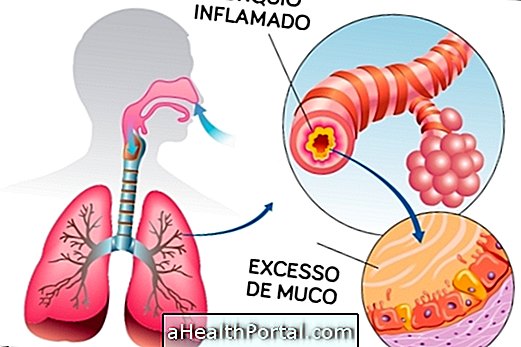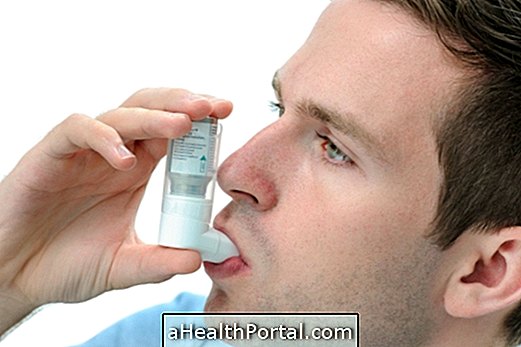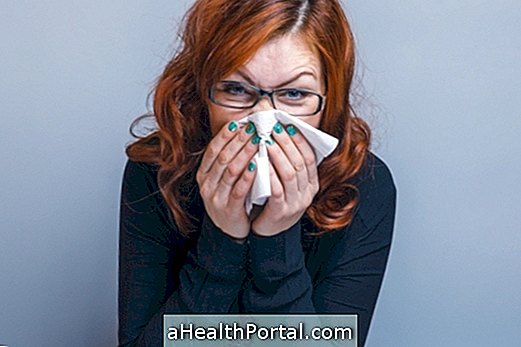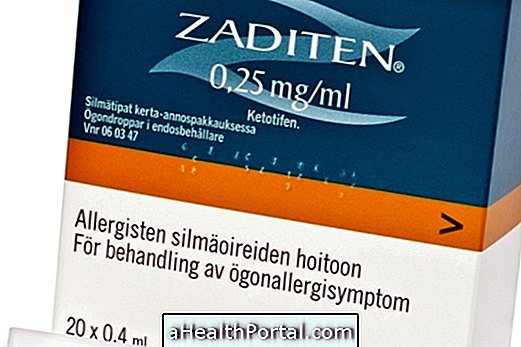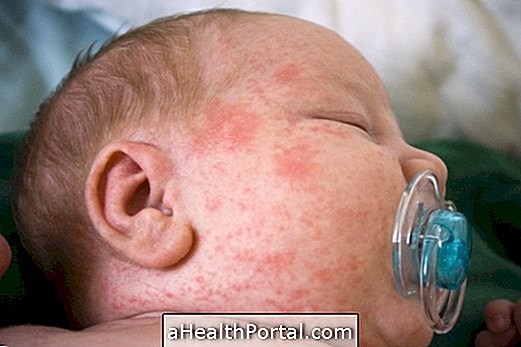Respiratory diseases are mainly caused by viruses and bacteria that are transmitted from one person to another, not only through droplets of secretion in the air but also by the contact of hands with objects that may contain micro-organisms that cause infections .
Some of the most common respiratory infections are colds, flu, sinusitis, tonsillitis, laryngitis, otitis and pneumonia, which mainly affect children and the elderly, because they have a more fragile immune system.
In addition, although they can occur at any time of the year, these diseases are more common in the winter, as it is a colder, drier period and when people try to stay in more closed areas, facilitating the proliferation of microorganisms. Thus, the main measures to prevent respiratory infections are:
1. Wash hands thoroughly
It is common for people to believe that respiratory infections occur through the air, but they forget that one of the major forms of contamination is through the hands, touching something that contains microorganisms, and then leading to the mouth, nose, or eyes .
Thus, to avoid a respiratory infection, it is recommended to wash your hands well, or at least use the alcohol gel, especially when going to public places, or when touching doorknobs, telephones, handrails or when using public transport, for example.
Check out the video below for the right way to wash your hands:

2. Avoid agglomerations and enclosed sites
It is easier to contract respiratory infections because they are places that are likely to proliferate microorganisms such as viruses, bacteria and fungi.
In this way, it is common to acquire these types of infections in places such as schools, kindergartens, nursing homes, shopping malls, parties or at work, since they usually contain more people indoors. Therefore, to avoid airway infections, it is recommended to maintain the airy, ventilated and illuminated environment in order to reduce the accumulation of microorganisms.
3. No smoking
Smoking facilitates the development of respiratory infections, as well as makes recovery difficult, as it causes inflammation of the airways, irritation of the mucosa and also the diminution of its mechanisms of protection.
In addition, those who live with the smokers are not free of their ills, since passive smoking also causes these effects in the airways. Therefore, it is recommended not only stop smoking but also not stay close to who is smoking.
Also check out 10 serious diseases caused by smoking.
4. Keep allergic rhinitis under control
Rhinitis is inflammation of the mucosa of the airways, especially the nose, and its presence facilitates the development of respiratory infections, as it decreases the effectiveness of the region's defenses.
In this way, it is important to avoid factors that trigger rhinitis, such as dust, dust mites, mold, pollen or pet hair, for example, as well as treat this inflammation properly if present, as a way to prevent it from becoming a cold or a sinusitis, for example. Check out the causes and how to treat allergic rhinitis.
5. Taking the flu vaccine
The flu vaccine can protect against flu-like viruses that cause influenza and can cause pneumonia, as is the case with H1N1.
It should be remembered that the vaccine protects only the viruses programmed in the vaccine formula, which are usually the most infectious and dangerous of that period. Thus, it does not protect against other viruses and therefore some people can get colds even if they have taken the vaccine.
Ask your questions about the flu vaccine in whom you can get the flu shot.

6. Stay hydrated
Keeping the body hydrated and with a balanced and balanced diet prevents falls of immunity that can facilitate an infection.
In this way, it is recommended to take about 2 liters of fluids per day, including water, juices, coconut water and teas, and also adopt a diet rich in vegetables as it contains vitamins and minerals that help protect the body.
7. Rest
Sleeping for at least 6 hours, preferably 7 to 8 hours a night, is recommended for the body to rebalance its metabolism and restore energy and immune system.
Thus, those who sleep very little are more likely to acquire infections, in addition to which the body tends to yield much less for any activity.
8. Keep the humidity in the air
The very dry air facilitates the proliferation of organisms and the dryness of the respiratory mucosa, so it is recommended to avoid excessive use of air conditioning and keep the environment more ventilated.
One tip is the moderate use of the air humidifier, on drier days, in order to balance moisture. Check out also homemade ways to humidify the air.
9. Use antibiotics only with medical advice
Using antibiotics without the proper guidance of the doctor is very harmful. It should be borne in mind that most infections are caused by viruses, and using antibiotics will not bring any benefit and instead will expose the body to its side effects that can be dangerous
In addition, the misuse of antibiotics causes the bacterial flora of the body to become unbalanced, facilitating the appearance of a worrisome bacterial infection.
Does using vitamin C protect against infections?
There is no scientific evidence that only the use of vitamin C can protect against a specific infection. However, consumption of vitamins and minerals such as vitamin C, vitamin A, vitamin E, omega-3, flavonoids, carotenoids and selenium, for example, are beneficial to the immune system as they are antioxidants.
Antioxidants prevent the buildup of free radicals in the body, which is useful in disease prevention and early aging. Vitamin C and other antioxidants can be consumed in the form of supplements, however, they are easily found in food, especially in vegetables. Check out what foods are rich in antioxidants.

